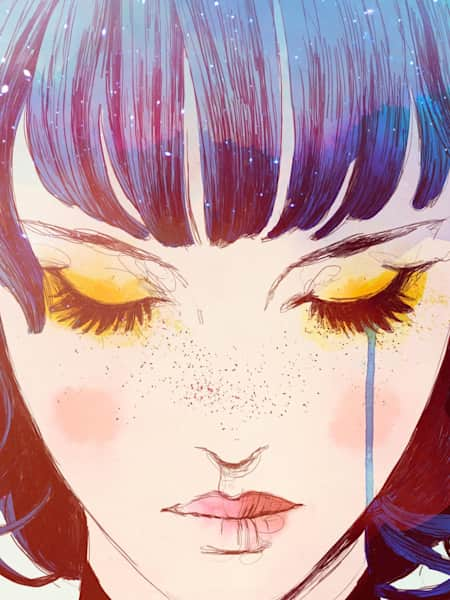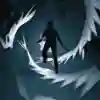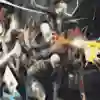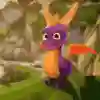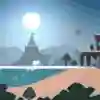Gaming
Gris will take your breath away in its opening moments. The game’s 90-second introduction weaves a wordless tale of a young girl suddenly hit by devastating loss, as the joy and comfort that once surrounded her crumbles and collapses. She tumbles far, far downwards, awakening lost and alone in a vast desert, but you must press onwards through a mysterious and fantastical world to overcome her grief.
It’s a game that’s clearly inspired by the emotive narrative adventures that have risen to prominence in the indie world over the last few years. In the loosest possible terms you could describe it as a puzzle-platformer, but similar to Journey, Flower, Swords & Sworcery and more, it aims to swap out many traditional video game mechanics in favour of evoking an atmosphere for you to wallow in.
Behind Gris are Nomada Studio: a Spain-based team founded by two ex-Square Enix and Ubisoft developers, Adrian Cuevas and Roger Mendoza, as well as artist, illustrator and painter, Conrad Roset. In the past, Adrian and Roger have worked on games such as Hitman, Far Cry, Rainbow Six and Assassin’s Creed – all excellent games, but all that involve some form of killing. For them, despite the positive experiences working on those megahits, it felt like time to lay down their arms and make a change.
“We wanted to do something different and Conrad wanted to do something more artistic as well.” explains Adrian of the game’s origins. “Basically, we like a lot of games like Journey and Ori [and the Blind Forest], these types of games that have different art styles. So, having Conrad, who has such a powerful art style, we decided to focus a lot on this, on the music and on having a subtle story.”
Although all three of these fit together beautifully, it’s the artwork that’s the most immediately arresting aspect of Gris. The stills are stunning, with any screenshot more than capable of being its own work of art, but it’s even more gorgeous in motion. Whether you’re strolling across that sizzling opening desert, soaring up decorative and aged buildings or swimming through glistening streams underwater, you’ll be awestruck by its magnificence. And through exploring that fascinating world, you’ll be able to piece together a story. Again, there’s that influence of Journey, of Limbo, of Inside.
“To be honest we owe them a lot, especially Journey and Flower and things like that,” explains Adrian. “When they came out there weren't many things like that and thanks to them we’re seeing more of those kinds of games. I don't know if they are all successful or not, probably the ones we hear of are, but I hope there will be more and more of them because I love them.”
That adoration has now pushed Adrian and the team at Nomada to actively create their own game in that style. Yet, trying to design a game that's intentionally avoiding a lot of the elements that define them is a unique challenge. For Gris, Nomada want no fail states and there’s no dialogue or text to tell the story. Instead, the aim is to make a straightforward game to play with a gentle pace so that you’re encouraged to take a more thoughtful approach.
“It was one of the hardest things when we were designing the game, because we didn't want to have a feeling that you are failing. We don't want you to have the pressure that you might die. It's really hard when you design a game and you’re not able to punish the player, but at the same we wanted to have a game that pretty much everybody can play and everybody can enjoy.”
Gris is interested in massaging entirely different parts of your mind – the ones to do with melancholy, with wonder, with introspection. It creates an atmosphere to elicit and explore those feelings with every extraordinary new environment you enter, as every stirring new music track seeps in, and every solved puzzle probes at the game’s deeper meaning.
At first, that might sound like an interesting combination for a game that’s published by Devolver Digital. Though they've definitely built a diverse publishing library over the years, their reputation is usually for more punk, brash and (often) violent titles. Exactly how did a game like Gris end up in their hands?
“It was actually quite easy,” explains Adrian. “We like Devolver as a publisher, they have this laid-back way and basically we sold them the game and they love it. They have other games like The Talos Principle and stuff like that, but of course it's not the first thing that comes to your mind when you think of Devolver. It's been so great to work with them. They let you do whatever you want and they push you when you need to or ask for it, so that's very, very nice.”
So while Gris may not immediately jump out as a Devolver title, it does still capture the publishers’ spirit of offering more original and unique games. It certainly fits that description, and that desire to show many different sides to what games can be is what also resonated with Adrian and Nomada. In a sense, their careers have taken them to both extremes: from the 400-500 person teams working on multi-million dollar franchises and now to a 20-person team working on a little indie gem in Barcelona.
“What we'd like is that people could see that there are a lot of different types of video games. We want to express that video games can also be art, because sometimes people forget that and they think it's just shooting. That can still also be a part of artwork, but video games are not just that.”
It’s a noble goal and after playing Gris it’s hard to dispute that they’ve made an excellent argument for games to be seen and considered that way. Gris is calm, it’s serene, it’s utterly absorbing and thought-provoking in ways so many games aren’t. And after that change of pace, would Adrian want to return to the world of big-budget games again, or does he prefer the new quiet life?
“I wouldn't say I would never work again on that because I had a lot of fun doing it, but I'm pretty sure the three of us founders at Nomada, if we can, and the game is successful enough, would like to do more games. I think we will always try to do something slightly different. Let's see what happens, though!”
Gris is coming to Switch and PC in December 2018.

